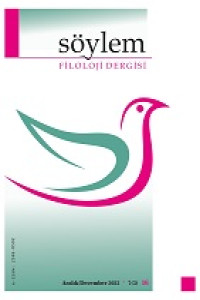Abstract
Evliyâ Çelebi, ömrünün büyük bir bölümünü seyahatlerde geçirip gördüğü, tecrübe ettiği ya da ikincil kaynaklar vasıtasıyla haberdar olduğu birçok olayı eserinde kaleme alarak bu bilgilerin bugüne ulaşmasını sağlamıştır. Seyahatnâme, muhteva genişliği ve döneminde alışılmışın dışındaki dili dolayısıyla yalnızca Türk edebiyatının değil, tüm dünya edebiyatının en önemli tarih kaynakları arasında yer almaktadır. Evliyâ Çelebi’nin sosyal statüsü ve eserin basmakalıp gezi edebiyatı ürünü dışında olması, eserin tarihi kaynak bağlamında önemini bir kat daha artırmaktadır. Keza Seyahatnâme’de çok sayıda savaş ve sefer konu edilmektedir. Çoğu savaşa bizzat katılan Seyyah, “savaş, gaza, sefer, cenk, fetih, fütühat” gibi sözcükleri bilinçli bir şekilde kullanmış ve 17. yüzyılda gerçekleşmiş birçok savaşta elde edilen ganimetten kullanılan silahlara, fethedilen yerlerden savaşa katılan askerlerin psikolojik durumlarına kadar bilgiler sunabilmektedir. Sunulan bu bilgilerde kullanılan dil, söz varlığı ve kimi yerlerde fonetik/morfolojik veriler savaş dili bağlamında da Seyahatnâme’yi ayrı bir yere konumlandırmaktadır.
Bu çalışmada Evliyâ Çelebi’nin ilgi çekici bir dille okuyanın gözünde canlandırma olanağı sunduğu savaş anlatıları; söz varlığı, Seyyah’ın sözcük tercihi ve kullanılan dil bağlamında ele alınacaktır. Böylece savaş edebiyatı bağlamında Seyahatnâme’nin konumu tespit edilmeye çalışılacaktır.
References
- Akalın, Ş. H. (2013). Seyyâh-ı Âlem Evliyâ Çelebi. Ankara: Türk Dil Kurumu Yayınları.
- Dankoff, R. (2008). Evliyâ Çelebi Seyahatnâmesi Okuma Sözlüğü. (Çev. S. Tezcan), İstanbul: Yapı Kredi Yayınları.
- Dankoff, R. (2010). Seyyâh-ı Âlem Evliyâ Çelebi’nin Dünyaya Bakışı. (Çev. M. Günay), İstanbul: Yapı Kredi Yayınları.
- Duman, M. (2011). Evliyâ Çelebi Konuşmaları/Yazılar. İçinde S. Koz (Ed.), Evliyâ Çelebi Yalancı mıydı? (s. 171-187). İstanbul: Yapı Kredi Yayınları.
- Emecen, F. (2009). Çağının Sıradışı Yazarı Evliya Çelebi. İçinde (Ed. N. Tezcan (Ed.), Askerî Dönüşüm Çağında Evliyâ Çelebi ve Ateşli Silâhlar (s. 137-146). İstanbul: Yapı Kredi Yayınları.
- Eren, M. (1960) Evliya Çelebi Seyahatnâmesi Birinci Cildinin Kaynakları Üzerinde Bir Araştırma. İstanbul: Edebiyat Fakültesi Matbaası.
- Ertaş, M. Y. (2012). Evliya Çelebi’nin Seyahatnâmesi’nde Gazâ. Tarih İncelemeleri Dergisi, 27(1), 79-100.
- Evliyâ Çelebi Seyahatnâmesi (2011). (haz. Dankoff, R., Kahraman, S. A., Dağlı, Y., Kurşun, Z.). İstanbul: Yapı Kredi Yayınları.
- İz, F. (1979). Evliyâ Çelebi ve Seyahatnâmesi. Boğaziçi Üniversitesi Dergisi Beşeri Bilimler, 7, 61-79.
- Kahraman, S. A. (2013). Evliya Çelebi ile Devr-i Âlem. Ankara: Türk Dil Kurumu Yayınları.
- Tezcan, S. (2011). Evliyâ Çelebi Konuşmaları/Yazılar. İçinde S. Koz (Ed.), Türk Dilinin Büyük Ustası Evliyâ Çelebi (s. 275-282). İstanbul: Yapı Kredi Yayınları.
- Tulum, M. (2011). XVII. Yüzyıl Türkçesi ve Söz Varlığı. Ankara: Türk Dil Kurumu Yayınları.
- Türk Dil Kurumu Türkçe Sözlük, www.sozluk.gov.tr (Erişim 16.06.2022).
Abstract
Evliyâ Çelebi, spent most of his life on travels, wrote down many events that he saw, experienced or was aware of through secondary sources, and ensured that this information reached today. Seyahatnâme is among the most important historical sources not only of Turkish literature but also of the whole world literature due to its breadth of content and unusual language in its period. Evliyâ Çelebi's social status and the fact that the work is out of the stereotypical travel literature product increases the importance of the work in the context of historical source. Likewise, many wars and expeditions are mentioned in Seyahatnâme. The traveler, who participated in most of the wars himself, used words such as "war, gas, expedition, war, conquest, conquest" consciously and can provide information from the loot obtained in many wars in the 17th century to the weapons used, and the psychological state of the soldiers who participated in the war from the conquered places. The language, vocabulary and in some places phonetic/morphological data used in this presented information position the Seyahatnâme in a different place in the context of the language of war.
In this study, war narratives, which Evliyâ Çelebi offers to visualize in the eyes of the reader with an interesting language, will be discussed in the context of vocabulary. Thus, the position of Seyahatnâme in the context of war literature will be tried to be determined.
Keywords
References
- Akalın, Ş. H. (2013). Seyyâh-ı Âlem Evliyâ Çelebi. Ankara: Türk Dil Kurumu Yayınları.
- Dankoff, R. (2008). Evliyâ Çelebi Seyahatnâmesi Okuma Sözlüğü. (Çev. S. Tezcan), İstanbul: Yapı Kredi Yayınları.
- Dankoff, R. (2010). Seyyâh-ı Âlem Evliyâ Çelebi’nin Dünyaya Bakışı. (Çev. M. Günay), İstanbul: Yapı Kredi Yayınları.
- Duman, M. (2011). Evliyâ Çelebi Konuşmaları/Yazılar. İçinde S. Koz (Ed.), Evliyâ Çelebi Yalancı mıydı? (s. 171-187). İstanbul: Yapı Kredi Yayınları.
- Emecen, F. (2009). Çağının Sıradışı Yazarı Evliya Çelebi. İçinde (Ed. N. Tezcan (Ed.), Askerî Dönüşüm Çağında Evliyâ Çelebi ve Ateşli Silâhlar (s. 137-146). İstanbul: Yapı Kredi Yayınları.
- Eren, M. (1960) Evliya Çelebi Seyahatnâmesi Birinci Cildinin Kaynakları Üzerinde Bir Araştırma. İstanbul: Edebiyat Fakültesi Matbaası.
- Ertaş, M. Y. (2012). Evliya Çelebi’nin Seyahatnâmesi’nde Gazâ. Tarih İncelemeleri Dergisi, 27(1), 79-100.
- Evliyâ Çelebi Seyahatnâmesi (2011). (haz. Dankoff, R., Kahraman, S. A., Dağlı, Y., Kurşun, Z.). İstanbul: Yapı Kredi Yayınları.
- İz, F. (1979). Evliyâ Çelebi ve Seyahatnâmesi. Boğaziçi Üniversitesi Dergisi Beşeri Bilimler, 7, 61-79.
- Kahraman, S. A. (2013). Evliya Çelebi ile Devr-i Âlem. Ankara: Türk Dil Kurumu Yayınları.
- Tezcan, S. (2011). Evliyâ Çelebi Konuşmaları/Yazılar. İçinde S. Koz (Ed.), Türk Dilinin Büyük Ustası Evliyâ Çelebi (s. 275-282). İstanbul: Yapı Kredi Yayınları.
- Tulum, M. (2011). XVII. Yüzyıl Türkçesi ve Söz Varlığı. Ankara: Türk Dil Kurumu Yayınları.
- Türk Dil Kurumu Türkçe Sözlük, www.sozluk.gov.tr (Erişim 16.06.2022).
Details
| Primary Language | Turkish |
|---|---|
| Subjects | Language Studies |
| Journal Section | DİLBİLİM / ARAŞTIRMA MAKALELERİ |
| Authors | |
| Publication Date | December 30, 2022 |
| Submission Date | September 15, 2022 |
| Acceptance Date | November 5, 2022 |
| Published in Issue | Year 2022 Volume: 7 Issue: 3 |

This work is licensed under a Creative Commons Attribution-NonCommercial-NoDerivatives 4.0 International License.


